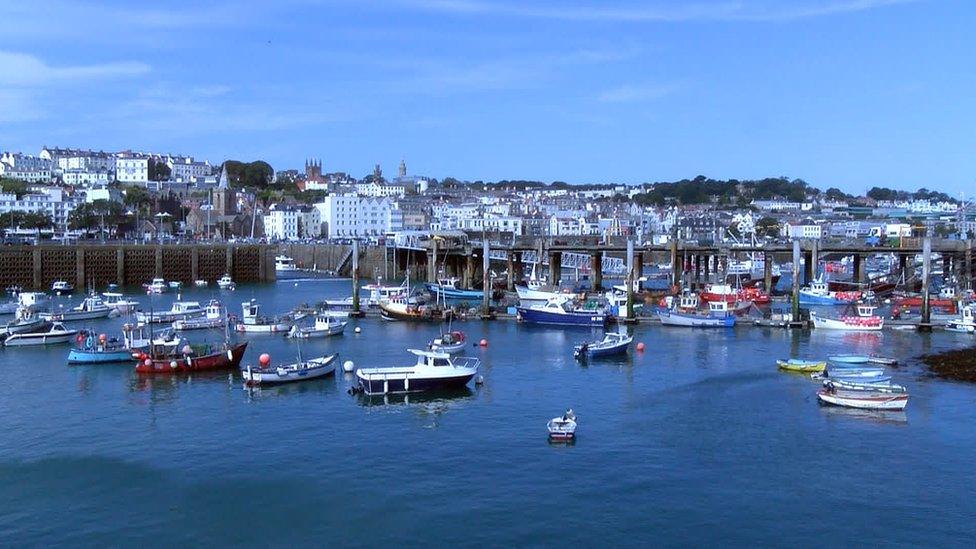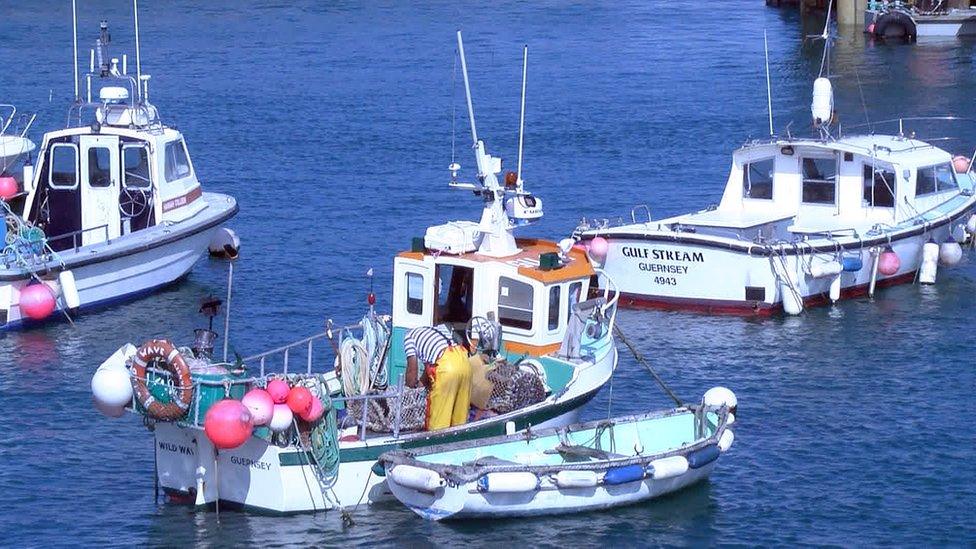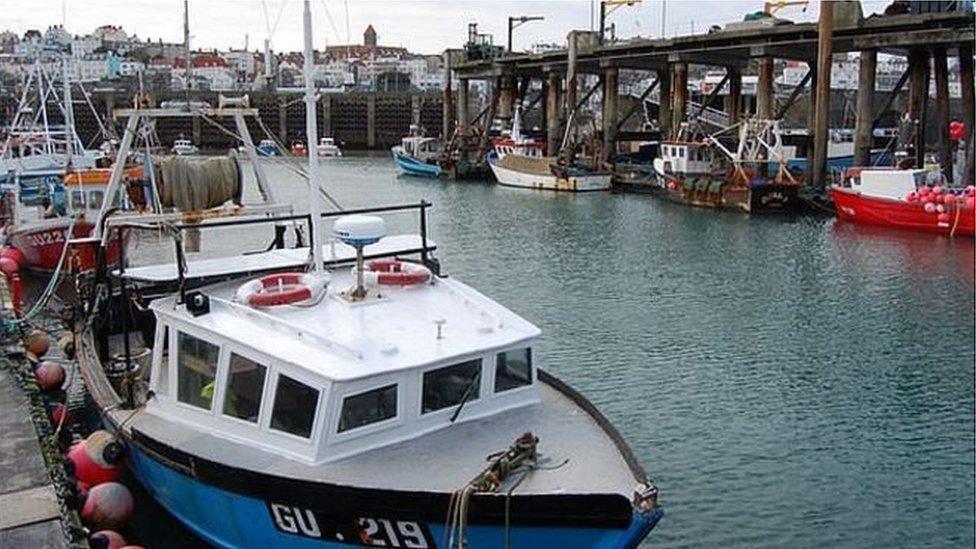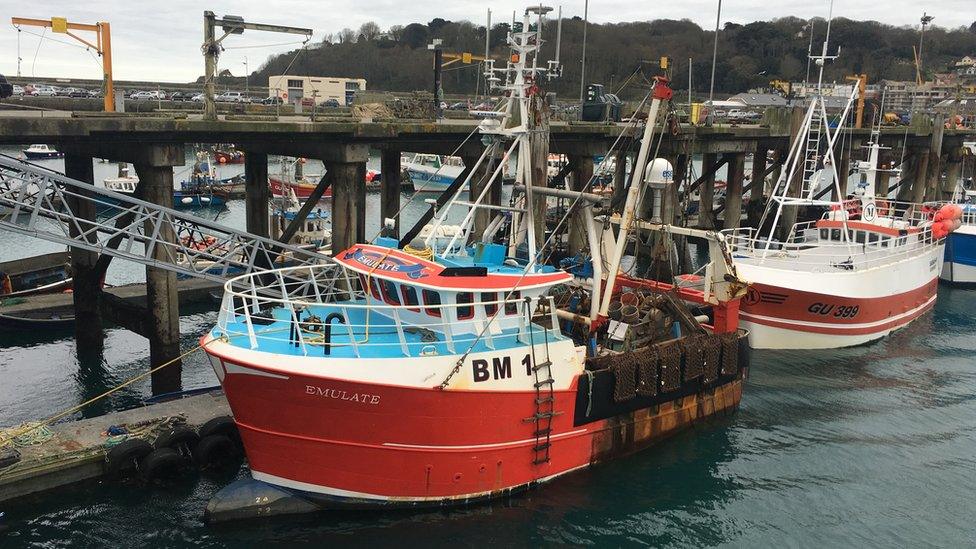Fishing row: Channel Islands face 'constitutional impasse'
- Published

A senior Guernsey politician said the UK must recognise the Channel Islands "historic rights"
A "constitutional impasse" could follow UK government attempts to legislate for the Channel Islands without consent, a Guernsey politician has said.
The dispute emerged after a clause allowing the UK to impose fishing rules was inserted into the Fisheries Bill.
Deputy Jonathan Le Tocq said fishing was a "domestic issue" and recognising "historic rights" could avoid disputes.
The UK government argues there is no constitutional issue and fishing is an international matter.
The bill aims to provide a legislative framework for fishing - an area of contention in the Brexit negotiations - after the end of the transition period on 31 December.
The UK government said the Fisheries Bill, which became law on Monday, "gives the UK full control of its fishing waters for the first time since 1973".
Earlier in November, the House of Lords inserted what is known as a permissive extent clause (PEC) into the bill, which enables them to legislate on behalf of the Crown Dependences over international matters.
Both Guernsey and Jersey objected to this move, while the Isle of Man did not.
'Absolutely in control'
Mr Le Tocq, who heads up Guernsey's external relations, said if the States of Guernsey failed to recognise any legislation the UK attempted to put in place it could lead to an "unprecedented" deadlock.
He explained such a crisis could be avoided, but this would require "personalities on the other side to help us and recognise our historic rights".
Responding to questions from fellow deputies in the States, Mr Le Tocq argued Guernsey considered fishing agreements to be a "matter for this assembly, a matter for Alderney and a matter for Sark" and the broader issue was a "constitutional matter".
He said: "We look forward to the UK trying to argue its case out of that, because clearly members of parliament in the UK in both houses agreed with us."
Jersey's External Relations Minister Ian Gorst echoed this sentiment, arguing the PEC was "constitutionally inappropriate," as well as being unwanted and unnecessary.
He said: "We remain absolutely, legally in control of our waters in the same way that we did before this piece of UK legislation."

Guernsey and France were briefly involved in a fishing dispute in February caused by "confusion" following Brexit
UK minister George Eustice said the UK government would always "work very closely" with the Crown dependencies over any agreement.
However, he argued the UK has always negotiated for the Crown dependencies over fishing matters, citing the precedent of imposing regulations on British vessels under the 1967 Sea Fish Conservation Act.
He said: "All the clause we added does is replicate that power."

Islands and fisheries
February 2020 - The introduction of a permit system for French vessels wanting to fish in Bailiwick of Guernsey waters means island fishermen can again visit French ports. A lack of pre-warning of the ending of the London Fisheries Convention due to Brexit was blamed for what French authorities called a ban on their fishermen
February 2020 - Jersey fisherman and supporters march asking for changes to the Bay of Granville Treaty - under which Jersey and French fishermen have been able to work in each others' waters since 2004
July 2019 - Islands' territorial waters extended to 12 nautical miles giving greater legislative and law enforcement authority
January 2018 - Quotas introduced for bailiwick vessels less than 10m (33ft) in length
December 2016 - The Fisheries Management Agreement was fully reinstated with the addition of quotas for boats longer than 10m
August 2015 - The bailiwick's Fisheries Management Agreement was suspended over a lack of quotas in the island and Guernsey fishermen were banned from UK and EU waters for more than two weeks
- Published13 November 2020

- Published4 February 2020
